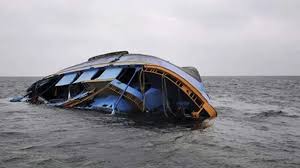The Nigerian Marine Coastguard Volunteer Services (NMCVS) has raised alarm over the growing danger posed by wreckage and debris littering Nigerian waterways, particularly in Ebute-Ero, Lagos. The organisation said the situation is becoming worse, especially as the rainy season continues to increase water levels, which could further submerge these wrecks, making them harder to detect and more dangerous to water users.
The Chief Commanding Officer of the NMCVS, Isaac Adamolekun, who spoke on the matter, warned that the continued presence of wrecks along the waterways poses serious threats to marine safety, human health, and the environment. According to him, some of these dangers include oil and chemical pollution, risk of collision, damage to marine life, and a general decline in the recreational and economic value of Nigeria’s coastal zones.
Adamolekun explained that the wrecks are not just old metal scraps; many of them still have oil and other hazardous substances in them, which gradually leak into the water and pollute it. These substances, he said, affect marine life by contaminating the food chain. When aquatic organisms absorb harmful chemicals, they become toxic and can pose health risks to humans who consume seafood from the affected waters.
“Wreckage in waterways poses several dangers, including pollution from leaking oil and hazardous materials, navigational hazards for waterway users, and potential impacts on marine life and human health, especially for marine tourists and water swimmers,” Adamolekun said. He noted that such risks are particularly evident in areas like Ebute-Ero in Lagos, where submerged wrecks are already lying in wait, and the rising water levels during the rainy season could worsen the situation.
He added that the accumulation of litter, wreckage, and other debris in the water does not only harm marine animals but also makes navigation very dangerous. “Entangled wildlife can be injured or killed, and the build-up of wreckage changes the marine environment, reduces oxygen levels, and spreads pollutants and diseases,” he said.
Adamolekun also raised concerns about the safety of marine tourism in Nigeria, saying that wrecks scare away tourists and discourage recreational water use. He explained that boat operators face serious risks when navigating through waters with hidden wrecks, as collisions could damage vessels, lead to loss of lives, or cause expensive repairs. “Wrecks, especially when submerged, are very difficult to detect by boat operators, posing a major hazard during navigation,” he said.
He said the decomposing waste from wreckage and marine litter releases harmful gases and chemicals that reduce oxygen in the water, making it difficult for fish and other aquatic animals to survive. “These dead zones in the water threaten marine biodiversity and reduce fishing activities,” he added.
On the economic side, Adamolekun pointed out that debris in waterways affects the value of coastal properties, damages fishing nets, and increases the cost of waterway transport due to the need for frequent repairs. He called for urgent action from relevant authorities to clear wrecks and enforce environmental safety regulations on Nigeria’s inland waterways.
“Chemical and physical pollution from wrecks can directly harm marine organisms and disrupt their life cycles. This is not just about the environment; it’s also about public health, transportation, fishing, tourism, and the safety of our communities,” Adamolekun warned.
He urged both government and private sector stakeholders to invest in marine cleanup efforts, regular monitoring, and enforcement of rules that prevent dumping of wrecks and other waste into waterways.
With the rainy season intensifying, marine experts are now warning that the dangers of waterway wreckage could multiply if urgent action is not taken to identify and remove submerged obstacles in heavily trafficked zones like Lagos. The NMCVS believes that cleaning up Nigeria’s waters is not just an environmental issue but a necessary step for national development, safety, and public health.
